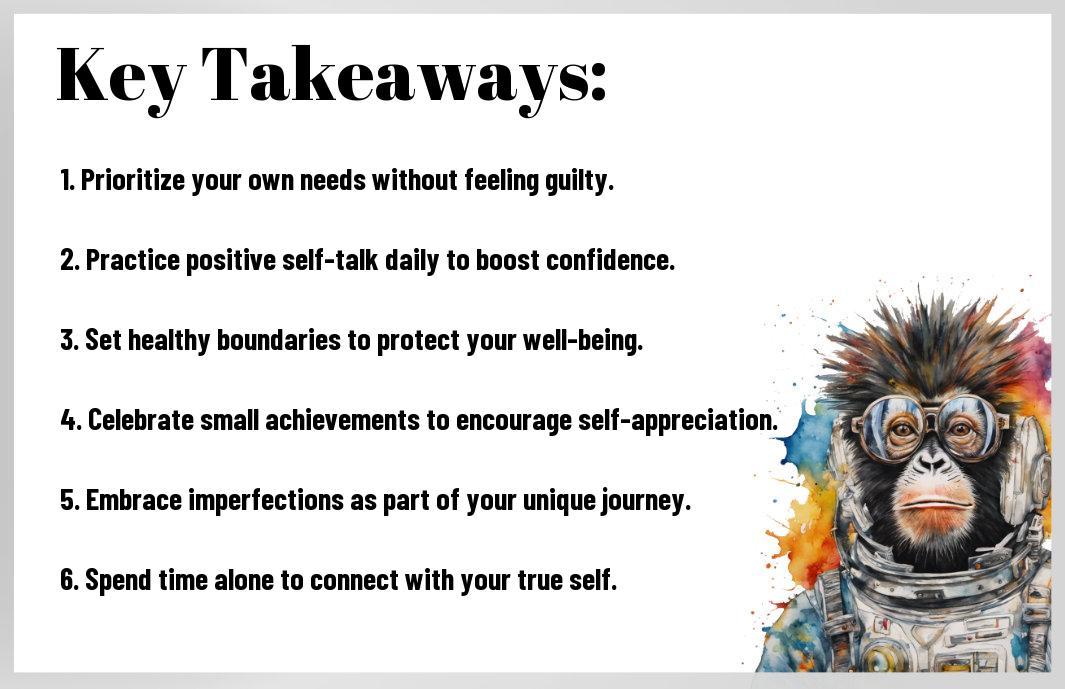Over time, cultivating self-love becomes crucial for your well-being and personal growth. In this guide, you will learn practical steps to nurture a positive relationship with yourself, embracing your unique qualities and setting healthy boundaries. By understanding the principles of self-love, you can improve your confidence, reduce stress, and foster a deeper sense of inner peace. This beginner’s guide is designed to empower you with knowledge and tools that encourage self-compassion and resilience, helping you build a foundation for a happier, more fulfilling life.

The Science Behind Self-Love
Psychological Benefits: Why Love for Self Matters
Embracing self-love reshapes how you handle stress and setbacks, boosting resilience through enhanced emotional regulation. Studies link higher self-compassion with lower rates of depression and anxiety, highlighting its role in fostering mental well-being. When you cultivate a kind and accepting attitude toward yourself, your confidence grows, allowing you to engage more fully in relationships and pursue goals without the weight of self-criticism holding you back.
The Neuroscience of Self-Compassion
Self-compassion activates brain regions associated with caregiving and emotional soothing, such as the insula and anterior cingulate cortex. Functional MRI studies reveal that practicing self-compassion increases activity in the vagus nerve, promoting calm and reducing the stress response triggered by the amygdala. This neurobiological shift helps you cultivate a compassionate inner voice rather than a critical one. https://roshorn.com/product/a-beginners-guide-to-self-love/
Diving deeper, research demonstrates that the neuropeptide oxytocin, often called the “love hormone,” plays a significant role during self-compassionate practices. Oxytocin release not only enhances feelings of safety and trust but also strengthens neural connections involved in empathy toward yourself. This biochemical response supports improved emotional resilience, suggesting that self-love engages both your brain’s emotional regulation systems and reward pathways, reinforcing positive self-related experiences over time.

Common Misconceptions About Self-Love
Self-love often gets tangled in misunderstandings that prevent you from fully embracing it. You might hear that it’s synonymous with selfishness or an excuse for laziness, but these beliefs miss the mark. True self-love emphasizes respect and care for your well-being, fostering growth rather than indulgence. Misguided views can turn this empowering practice into a source of guilt or confusion, limiting your ability to develop a healthy relationship with yourself.
Distinguishing Self-Love from Narcissism
While both self-love and narcissism involve focusing on oneself, you’ll find their core intentions diverge significantly. Self-love is about acceptance and nurturing your worth without diminishing others, whereas narcissism elevates self-importance often at others’ expense. Self-love encourages empathy and connection, creating balance in your relationships, whereas narcissism thrives on validation and control, disrupting social harmony and personal growth.
The Myth of Self-Care: It’s More Than Pampering
Self-care transcends occasional indulgent treats like spa days or gourmet meals. It involves consistent, intentional practices that support your mental, emotional, and physical health. Establishing boundaries, prioritizing sleep, and seeking help when needed are integral elements. When you perceive self-care as merely pampering, you risk overlooking the daily habits that build resilience and sustain well-being over time.
Expanding on the real essence of self-care, think about it as the foundation of your self-love journey. Clinical studies show that regular sleep and stress management reduce the risk of chronic illnesses by up to 50%. Incorporating small but steady activities—like journaling, mindful breathing, or balanced nutrition—creates a sustainable self-care routine. This approach nurtures your whole self rather than offering temporary relief, enabling you to respond to life’s challenges with greater strength and clarity.
Actionable Strategies to Cultivate Self-Love
Developing self-love involves intentional practices that reshape your mindset and habits. By integrating daily strategies such as journaling, setting healthy boundaries, and engaging in activities that bring you joy, you lift your emotional well-being and reinforce your worthiness. These ongoing actions create a foundation that supports deeper acceptance and compassion toward yourself, helping you to counteract negative self-talk and external pressures.
Mindfulness Practices for Self-Reflection
Mindfulness invites you to observe your thoughts and feelings without judgment, creating space for honest self-reflection. Simple techniques like focused breathing or guided body scans increase your awareness of inner experiences. This enhanced awareness can reveal limiting beliefs or patterns that undermine your self-love, allowing you to challenge and reframe them with kindness and clarity over time.
Daily Affirmations and Their Impact on Self-Perception
Daily affirmations act as powerful tools to shift your internal dialogue by repeating positive statements about yourself. Regularly affirming qualities such as confidence, resilience, or worthiness rewires your brain to focus on strengths rather than shortcomings. Over weeks, this practice can measurably improve self-esteem, reducing the effects of self-doubt that often hold you back from embracing your full potential.
Extensive studies explain why affirmations help by activating brain regions linked to motivation and self-processing. Neuroscientific research reveals that affirmations bolster the ventromedial prefrontal cortex, which integrates self-related information and softens reactions to stress. For instance, a 2015 study found participants who practiced daily affirmations showed decreased neural threat responses during stressful tasks. This means affirmations are more than feel-good phrases—they actively rewire your mind to respond more resiliently to challenges and enhance your overall self-perception.
Overcoming Self-Doubt: Tools and Techniques
Self-doubt can creep in unnoticed, undermining your confidence and clouding your judgment. Tackling it requires adopting targeted strategies that illuminate your inner critic’s distortions. Through mindful reflection and practical exercises, you begin to rewrite the narrative you tell yourself, reinforcing your strengths and embracing growth opportunities. This allows you to transform hesitation into decisive action and elevate your sense of self-worth over time.
Identifying Negative Self-Talk Patterns
Recognizing patterns like all-or-nothing thinking, catastrophizing, or discounting the positive is the first step to dismantling harmful self-talk. You might notice thoughts that exaggerate your flaws or predict failure without evidence. Keeping a thought journal for a week reveals recurring themes, enabling you to challenge and reframe these automatic judgments. This practice shifts your mental script, helping you engage with reality more accurately and compassionately.
Building Resilience Against Criticism
Developing a thick skin toward criticism involves distinguishing constructive feedback from harmful remarks and learning to absorb the former without internalizing the latter. Techniques such as practicing self-compassion, seeking evidence before accepting a negative comment as truth, and focusing on your progress build mental fortitude that protects your self-esteem. Over time, you respond to criticism with curiosity instead of defensiveness, using it as a tool for improvement instead of a source of self-doubt.
Expanding on this, cultivating resilience against criticism also means establishing boundaries around whose opinions you value. Not all feedback carries the same weight; understanding the intent and expertise behind the comment helps you prioritize which input deserves your attention. Cognitive behavioral techniques like thought-stopping and visualizing a “safe space” before engaging in potentially critical discussions can reduce anxiety and prevent negative spirals. By framing criticism as data rather than judgment, you empower yourself to learn selectively and maintain confidence even when faced with challenging evaluations.
The Role of Community in Fostering Self-Love
Community nurtures the path to self-love by providing a mirror reflecting both your strengths and areas for growth. Positive groups offer validation, encouragement, and shared experiences that dismantle isolation. Engaging with others who prioritize well-being helps you internalize acceptance and compassion, reinforcing your own worth. Within these supportive circles, you learn to celebrate small victories and normalize setbacks, embedding resilience in your self-perception. The communal energy acts as a catalyst, transforming abstract self-love concepts into tangible, daily practices that uplift and sustain you.
Surrounding Yourself with Positivity: The Impact of Relationships
Every relationship shapes your self-view, either lifting your confidence or breeding doubt. Cultivating connections that express genuine care and respect creates an emotional safety net. Friends and family who listen without judgment and celebrate your authentic self boost your inner dialogue. This positive reinforcement rewires old, critical thought patterns, replacing them with affirming narratives. When your social circle models healthy boundaries and self-appreciation, you absorb these behaviors, which ripple into your self-love journey.
Joining Support Groups and Their Benefits
Support groups provide specialized environments where vulnerability and healing thrive. Access to peers facing similar challenges fosters empathy and dismantles feelings of uniqueness in your struggles. Structured discussions and shared coping strategies offer practical tools to overcome hurdles. These gatherings establish accountability and consistent motivation, making progress feel achievable. Plus, witnessing others’ resilience can inspire your own commitment to self-care practices and enhance a sense of belonging imperative to sustained self-love.
Diving deeper, support groups often offer more than camaraderie—they function as incubators for growth. Studies reveal that participants in peer-led support programs report a 30-40% increase in self-esteem after several months. The exchange of perspectives provides fresh insights into personal patterns and introduces new techniques for managing setbacks. You also gain access to resources that might not be available individually, such as guided meditations, workshops on self-compassion, or expert guest speakers. This multi-layered support sharpens your emotional intelligence and empowers you to embrace self-love with confidence and clarity.
Final Words
To wrap up, embracing self-love is a transformative journey that empowers you to treat yourself with kindness and respect. By practicing self-compassion, setting healthy boundaries, and appreciating your unique qualities, you build a strong foundation for personal growth and well-being. Self-love is not about perfection but about honoring your worth and nurturing your inner strength. As you continue this path, you’ll find greater confidence and a deeper connection to yourself, enabling you to live a more fulfilling and joyful life.


Leave a Reply